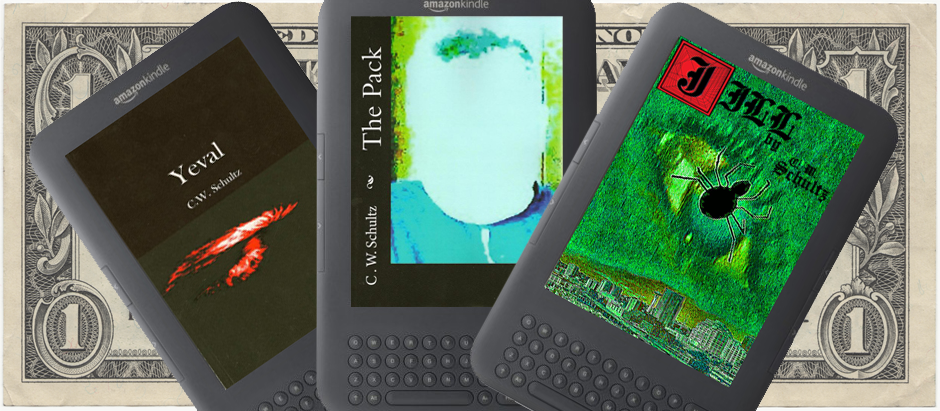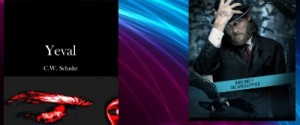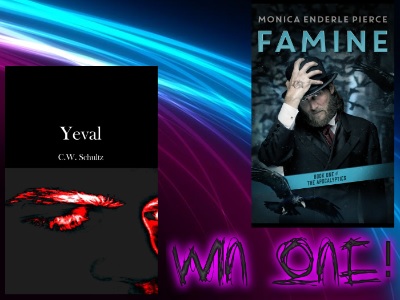C. W. Schultz was interviewed by Write Publish & Impact, a writing circle of authors and editors from Japan, New Zealand and the United Kingdom. Here is an excerpt of the interview from September 12, 2021.
Category: Yeval
Another message from C. W. Schultz: Upcoming fifth novel and celebrating YEVAL’s 10th year anniversary
It’s been nine months since a website update, and ten years since Yeval was published, so I thought I should say something.
For starters, I’m not one for nostalgia. Don’t get me wrong, I get that same warm feeling everyone else does when encountering a movie, song or show from my childhood (Hulu has Doug, by the way). But when it comes to my creative process, I never look back.
I had considered doing a second edition of Yeval, for its tenth year anniversary, but realized it’s just not in me to do something like that. When writing Yeval, I did the same thing as all my other books; I dedicated myself fully to the project… until publication. Aside from the promotional phase, I completely release myself from the book after publishing. I never wallow in my work after it’s been shared with the world. It’s not that I’m tired of it; it’s the painful obsession of wanting to make revisions over and over. My work would never be published if I gave into this urge. There are always minor tweaks you want to make. Before you know it, it could end up being a completely different story. So, to go back after ten years and do a second edition of Yeval would surely result in me making changes. Then, I’d set myself up for a twentieth anniversary edition, thirtieth, fortieth, fiftieth… it’d never end. Maybe some writers are interested in doing this; perhaps it breathes new life into their work. For me, I have no interest.
In saying that, it’s actually not unusual for me to go back and reference excerpts for my portfolio, and when I go back to Yeval, there’s something special about it. I’m sure some people will say, “If you obsess over your work while you’re writing it, why are there grammar errors on page X and again on page Y, and how did you miss the one on page Z?” When it comes to grammar, no writer, regardless of how renowned they are, is free of making mistakes. That’s why there are proofreaders. Even the big publishing houses, with several eyes on one book, still get the occasional error printed. So, I don’t think of grammar as the make-or-break of a book for me. My focus has always been the story, and it always will be. When given the opportunity, I try to adopt the label of “storyteller” over “author” or “writer” because I think the latter two evoke the idea of being a walking talking dictionary and thesaurus. If that’s what a writer is supposed to be, count me out.
There are times where I think it’s necessary to explain myself, but a good majority of the time, I believe my work speaks for itself. Yeval is a great example of this, whether we’re talking about my intentions, creative decisions or grammar errors. Going back and skimming through for good excerpts, I often find myself satisfied by its rawness. There’s no hint of pressure or influence about it. This book was truly indie. I let no criticism hold me back from what I felt was necessary for the story. When it came out in July 2007, my instinct was to be ready to explain myself. As time went on, I matured to the philosophy that if I didn’t put it in the book, then explaining it wasn’t necessary. Every time I go back and flip through the book, I’m afraid I might find something that I wish I would’ve done differently or explained a little better. But I didn’t. When I revisit the random paragraphs or pages (and, rarely, entire chapters) once or twice a year, I remember exactly why I did what I did. For all the life lessons I’ve learned in the last ten years, and all the maturity I’ve done as a writer, I’m very happy that I can go back to my very first book and still confidently stand behind it. Take a guy like Bill Maher, who says he can’t even bring himself to watch his old standup because he thinks it’s so bad and he’s come such a long way. I don’t have that feeling with Yeval.
I guess this means, even ten years gone, I’m still proud of Yeval.
So, that’s about as nostalgic as I’ll ever get. Like I said, I always look forward. In looking forward, I’m gonna throw out some news of what I’ve been working on for the last year because, who knows, it could take another nine months for an update.
In my last post, I mentioned I had moved to the other side of the city. A change in habitat is a big deal for me. I also lost a loved one back in October 2016. With all the adjustments, ups-and-downs, smiles-and-frowns… the chaos of life really influences the writing process. So, I’ve been hard at work with a fifth novel. It’s called The Fall of Peacetime, it’ll be about 150,000 words (my longest work yet) and will likely be released in 2018. The title is a double entendre, so I think an autumn release will be the best move. Even though it’s a medieval fantasy novel (a genre that I’ve personally always loved and respected), the direction I’m taking the story will go hand-in-hand with other horror sub-genres I’ve written about, like: cults, inner-demons and serial killers. Like any artist who wants their craft to grow, I wrote this book intending to appeal to readers of my other books while also broadening my horizons to find a new audience. I think both crowds will be in for a surprise.
Stay tuned…
A message from C. W. Schultz: Celebrating 5 Years of Having my Very Own Website!
It’s been over 10 months since a website update. I think that’s the longest www.cwschultz.com has gone since its launch back in October 2011. Oh, that’s another thing, Happy 5 Years to the website! If all continues to go well, I look forward to another five years with updates on a more frequent basis.
While the updates have been scarce lately, this shouldn’t imply that I haven’t been hard at work. Sure, there’s been a few distractions. Mainly, Snowpuff, the Wife and I have gone from renting an overpriced 650 square foot apartment in the University District to practically stealing (though we legally bought it) the perfect home in West Seattle. And yes, this is great news, but those of you who’ve spent a lot of time in both the University District and West Seattle will understand that it is necessary to just take some time and acclimate.
But even with the change from U-District to Dub-Sea, I refused to allow the creativity to rust. Most of late-2015 and early-2016 was dedicated to promoting my fourth book, A Book About a Film, which received the most promotion out of all my publications, and I’m happy to say was met with very kind words from the folks patient enough to push through it.
Mid-2016, was the start of a fifth novel inspired by the Voynich manuscript, which failed after about four weeks of work and has since been scrapped. But that doesn’t mean it’ll never happen. Keep in mind, I’ve been known to salvage unrealized projects before. Let’s not forget that Yeval was originally a screenplay that was eventually scrapped mainly due to length (having added the internal monologue and elements of transgressive fiction afterwards, when I realized I’d get more attention and satisfaction out of the story being more of an ugly art piece rather than dark entertainment, though I secretly wanted it to be both); and Echo with Laughter was a script rejected by a director/friend/producer for being too “on the nose”, but I ended up turning it into a short-story and Sirens Call Publications published it as The Stairwell. And then, of course, there’s A Book About a Film, that got several false starts between 2010–2014. So, if this Voynich manuscript idea sounds appealing to you, never say never.
But even though that particular “fifth novel” didn’t work out doesn’t mean there’s not another fifth novel in the works. In fact, that’s my main motivation for posting this today. Two chapters and a prologue have been completed, and while this is not deep enough to the point of no return, I’ve written over 17,000 words of internal notes; so, I technically have half a novel’s worth down, so I do think it’s a bit far to turn back. Plus, this was the story I’ve been wanting to write for several years, but have forced myself to hold off. Maybe that’s why the Voynich manuscript idea didn’t work out; maybe I’m simply far more passionate about this current idea than the Voynich one.
So what’s this big passionate idea I have? Isn’t it better to keep you in suspense? No? Well, I respectfully disagree, but I’ll compromise and share some details wit-cha. I’m going back to the first-person narrative. I know, I know, there are a lot of limitations, but I think it’s best for the story. So far, I’ve written four books, my first two in the first-person (Yeval and The Pack) and my most recent two in the third person omniscient (Jill, very omniscient; and A Book About a Film); I’m digging back into the style of my early days of publication, already almost 10 years ago, of first person narration. But like with every new story I write, I want to do it differently. Instead of having one main character narrating the story (props to Randy Mulray and Siggy Farris), I’m going to have several different characters tell their story, which takes place during the buildup of a great war (with an obvious war-is-not-great moral, but I’ll try not to be cliché about it); a writing style that first got my attention when reading Chuck Palahniuk‘s Snuff.
As for when you’ll get to read this work all depends on how long it takes me to write it, which in turn depends on how long it is. I’ve been pretty accurate with my release date estimations but have a tendency to overestimate my word count during the writing process. Right now, it looks like I’m on track to meet my one-novel-every-three-years average (so late-2018), with a likely length of 125,000 words. Before finishing the first chapter, I thought all my ideas would result in a read far more dense, like 300,000 words; but, like with my other books, when I get the ideas on paper, I like to keep things tight. I don’t like a moment of boredom, or a single word to go to waste. An editor for Jill once told me I had so much going on so quickly—a statement I couldn’t deny, originally planning to divide the story into 2–4 separate books—but I refused the suggestion to fluff my material. Reading takes time and it’s very easy to get bored. A reader should be entertained from the first word to the last; and there should be things underneath the surface, between the lines, so the reader is motivated to come back and discover something that wasn’t there the first time. So, will this fifth novel that’s gone from 300,000 words down to 125,000 words perhaps go lower? I doubt it, because unlike Jill, which was a beginning, middle and an end that I thought could be so expansive that I’d have to divide it up; this fifth novel is a beginning, middle and end to the start of a great war. Will I want to write about the war itself and the aftermath of it? Maybe, but that would be two different books. And while I’ve said before that I generally find sequels unnecessary, a sequel(s) to novel #5 might be necessary.
But here’s a critical thing: I don’t want to be that writer who just publishes book after book, as if it’s the size of the bibliography that counts instead of the actual stories. While I don’t think of my work in terms of good or bad (that’s the reader’s job, not the writer’s), my books mean a lot to me and I intend that each of them continue to count for something. A day won’t come when I do this strictly for money or the size of my bibliography or to stay relevant, etc. I write because it makes me happy; sometimes it’s therapeutic, other times I simply just want to write. If the day comes when I stop loving it, I won’t force some piece of tripe into the world. Like I said, reading is hard. It takes time and patience. To present to the world a story so insincere is, to me, a writer’s greatest crime.
I’m not saying I’ve published masterpieces. Again, it’s up to the reader to decide good or bad, not the writer. I fully admit that the grammar Nazis would have a field day with me. But only someone who has absolutely no creative backbone could think that something not printed through those huge publishing houses (most of which have at least a couple of errors of their own) could be free of any grammar issues. There’s a difference between presentable and quality. One is polished, the other may be something that’s tarnished; but many times, the latter has more heart. And despite any shortcomings I have as a writer (like shamelessly starting sentences with “and” and “but”), my work always comes from the heart. And while the criticizers say some pretty funny things, it’s those that enjoyed my books and write me about it who make this all worthwhile. Chef Ben Shewry once told himself after he received one of his first compliments, “[I]f there’s one table that likes it, there will be others.” I don’t see why the same doesn’t go for books.
So even though I write because I love it, it’s the kind words of those who took the time to send me compliments that keeps me going. And, with that said, I’ll get back to writing.
Best,
C-Dub
“YEVAL” for free on Kindle through 09/13/2015
 C. W. Schultz’s 2007 debut Yeval is available for free on Kindle from 09/09/2015–09/13/2015. Click here to get it from Amazon.
C. W. Schultz’s 2007 debut Yeval is available for free on Kindle from 09/09/2015–09/13/2015. Click here to get it from Amazon.
Despite Yeval not being critically recognized, the Utica Public Library put the novel on their list of Guy Lit along with many other contemporary classics. Georgina Parfitt of TowerBabel gave the book a ★★★★ (out of five) review, calling the overall structure well-paced, going on to explain that although it is an uncomfortable read, it is nonetheless “interesting, and highly thought-provoking, with moments of really moving writing.”
TowerBabel features Yeval
![]() TowerBabel, the place to go to “fall in love with books”, will include Schultz’s debut novel Yeval as a Featured Book later this month. Georgina Parfitt has given the book a ★★★★ (out of five) review. If you enjoy browsing for books, reading reviews, or posting your own opinions, please make sure to check out TowerBabel.
TowerBabel, the place to go to “fall in love with books”, will include Schultz’s debut novel Yeval as a Featured Book later this month. Georgina Parfitt has given the book a ★★★★ (out of five) review. If you enjoy browsing for books, reading reviews, or posting your own opinions, please make sure to check out TowerBabel.
A disturbing but gripping internal monologue
There’s something very alive and vivid about this set of messed-up characters. Randy as a narrator is, necessarily, almost completely unreliable, as he is bullied and tormented by a figure in his mind called Yeval, who Randy describes as being created by his own guilt over the death of his mother.
Randy’s voice jerks and despairs as his reality becomes less and less stable over the course of the novel. This lends a suspenseful and unpredictable mood to it. The angry eruptions of the narrative voice make the reading experience feel dangerous but quick-moving. At times I felt I needed a less chaotic way through, from one event to the next, but I appreciated the author’s commitment to the scattered, often terrifying, movement of his main character’s psyche.
Some of this story is deeply unsettling, and that’s a necessary evil of its subject matter, but I was impressed with how tender and warm the narrative was able to get between the angrier episodes. Randy’s brother, the love of his life Caroline, and his late mother are all at various times conjured with extreme affection. I think this aspect of the novel is almost the most important; it’s the humanity and sympathy of these sections that propels the reader on, and inspires her to seek to understand even the most obscene sections of Randy’s interior monologue.
The writing is best when it doesn’t over explain itself. Moments of profound emotional resonance are possible when the narrator speaks simply and honestly, and when repetition is avoided. ‘“I’m with somebody,” I respond. It feels like a confession,’ Randy tells us when he is reunited with his beloved ex-girlfriend Caroline. Lines like this give us a simple insight into the moment-by-moment emotional journey of this character that is helpful when trying to negotiate his unpredictable actions.
The structure of the novel overall is well-paced, and leads the reader deeper and deeper into the internal danger of Randy’s mind. Just as the mystery of Slayer and Yeval seems to be unwinding, it obscures and convolutes again, and we are left with an indistinct and upsetting ending, but one that feels fitting for this story.
In short, not a comfortable read, but interesting, and highly thought-provoking, with moments of really moving writing.
Eden’s Exchange talks to C. W. Schultz
Check out Eden’s Exchange, a cool blog from Canadian writer Eden Baylee that has a fun interview with C. W. Schultz.
$1 Books
Win a copy of “YEVAL”
Win a free copy of C. W. Schultz’s debut novel Yeval by playing the Masquerade Crew Book Club’s Horror Book Scavenger Hunter and Giveaway.
Vote for C. W. Schultz
The Masquerade Crew Book Club is currently having a Cover Wars competition, where readers vote for their favorite book cover on a select list… and all three novels by C. W. Schultz are featured! In fact, you can vote for 10 different covers, not just one! Click here to vote!

 For a limited only, all three of C. W. Schultz’s novels (
For a limited only, all three of C. W. Schultz’s novels (


